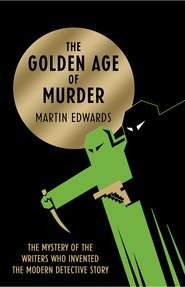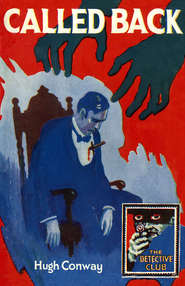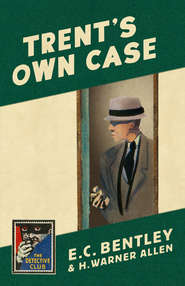По всем вопросам обращайтесь на: info@litportal.ru
(©) 2003-2024.
✖
The Terror
Автор
Год написания книги
2019
Настройки чтения
Размер шрифта
Высота строк
Поля
CHAPTER II (#u10637c19-557c-5c6b-a219-32a97fe2369e)
IT was a rainy night in London. Connor, who had preferred it so, turned into the side door of a little restaurant in Soho, mounted the narrow stairs and knocked on a door. He heard a chair move and the snap of the lock as the door was opened.
Soapy Marks was there alone.
‘Did you see him?’ asked Connor eagerly.
‘O’Shea? Yes, I met him on the Embankment. Have you seen the newspapers?’
Connor grinned.
‘I’m glad those birds didn’t die,’ he said.
Mr Marks sneered.
‘Your humanity is very creditable, my dear friend,’ he said.
On the table was a newspaper, and the big headlines stared out, almost shouted their excitement.
GREATEST GOLD ROBBERY OF OUR TIME.
THREE TONS OF GOLD DISAPPEAR BETWEEN SOUTHAMPTON AND LONDON.
DEAD ROBBER FOUND BY THE ROADSIDE.
THE VANISHED LORRY.
In the early hours of yesterday morning a daring outrage was committed which might have led to the death of six members of the C.I.D., and resulted in the loss to the Bank of England of gold valued at half a million pounds.
The Aritania, which arrived in Southampton last night, brought a heavy consignment of gold from Australia, and in order that this should be removed to London with the least possible ostentation, it was arranged that a lorry carrying the treasure should leave Southampton at three o’clock in the morning, arriving in London before the normal flow of traffic started. At a spot near Felsted Wood the road runs down into a depression and through a deep cutting. Evidently this had been laid with gas, and the car dashed into what was practically a lethal chamber without warning.
That an attack was projected, however, was revealed to the guard before they reached the fatal spot. A man sprang out from a hedge and shot at the trolley. The detectives in charge of the convoy immediately replied, and the man was later found in a dying condition. He made no statement except to mention a name which is believed to be that of the leader of the gang.
Sub-Inspectors Bradley and Hallick of Scotland Yard are in charge of the case…
There followed a more detailed account, together with an official statement issued by the police, containing a brief narrative by one of the guards.
‘It seems to have created something of a sensation,’ smiled Marks, as he folded up the paper.
‘What about O’Shea?’ asked the other impatiently. ‘Did he agree to split?’ Marks nodded.
‘He was a little annoyed—naturally. But in his sane moments our friend, O’Shea, is a very intelligent man. What really annoyed him was the fact that we had parked the lorry in another place than where he ordered it to be taken. He was most anxious to discover our little secret, and I think his ignorance of the whereabouts of the gold was our biggest pull with him.’
‘What’s going to happen?’ asked Connor in a troubled tone.
‘We’re taking the lorry tonight to Barnes Common. He doesn’t realise, though he will, that we’ve transferred the gold to a small three-ton van. He ought to be very grateful to me for my foresight, for the real van was discovered this evening by Hallick in the place where O’Shea told me to park it. And of course it was empty.’
Connor rubbed his hand across his unshaven chin.
‘O’Shea won’t let us get away with it,’ he said, with a worried frown. ‘You know him, Soapy.’
‘We shall see,’ said Mr Marks, with a confident smile.
He poured out a whisky and soda.
‘Drink up and we’ll go.’ He glanced at his watch. ‘We’ve got plenty of time—thank God there’s a war on, and the active and intelligent constabulary are looking for spies, the streets are nicely darkened, and all is favourable to our little arrangement. By the way, I’ve had a red cross painted on the tilt of our van—it looks almost official!’
That there was a war on, they discovered soon after they turned into the Embankment. Warning maroons were banging from a dozen stations; the darkened tram which carried them to the south had hardly reached Kennington Oval before the anti-aircraft guns were blazing at the unseen marauders of the skies. A bomb dropped all too close for the comfort of the nervous Connor. The car had stopped.
‘We had better get out here,’ whispered Marks. ‘They won’t move till the raid is over.’
The two men descended to the deserted street and walked southward. The beams of giant searchlights swept the skies; from somewhere up above came the rattle of a machine-gun.
‘This should keep the police thoroughly occupied,’ said Marks, as they turned into a narrow street in a poor neighbourhood. ‘I don’t think we need miss our date, and our little ambulance should pass unchallenged.’
‘I wish to God you’d speak English!’ growled Connor irritably.
Marks had stopped before the gates of a stable yard, pushing them. One yielded to his touch and they walked down the uneven drive to the small building where the car was housed. Soapy put his key into the gate of the lock-up and turned it.
‘Here we are,’ he said, as he stepped inside.
And then a hand gripped him, and he reached for his gun.
‘Don’t make any fuss,’ said the hated voice of Inspector Hallick. ‘I want you, Soapy. Perhaps you’ll tell me what’s happened to this ambulance of yours?’
Soapy Marks stared towards the man he could not see, and for a moment was thrown off his guard.
‘The lorry?’ he gasped. ‘Isn’t it here?’
‘Been gone an hour,’ said a second voice. ‘Come across, Soapy; what have you done with it?’
Soapy said nothing; he heard the steel handcuffs click on the wrist of Joe Connor, heard that man’s babble of incoherent rage and blasphemy as he was hustled towards the car which had drawn up silently at the gate, and knew that Mr O’Shea was indeed very sane on that particular day.
CHAPTER III (#u10637c19-557c-5c6b-a219-32a97fe2369e)
TO Mary Redmayne life had been a series of inequalities. She could remember the alternate prosperity and depression of her father; had lived in beautiful hotel suites and cheap lodgings, one following the other with extraordinary rapidity; and had grown so accustomed to the violent changes of his fortune that she would never have been surprised to have been taken from the pretentious school where she was educated, and planted amongst county school scholars at any moment.
People who knew him called him Colonel, but he himself preferred his civilian title, and volunteered no information to her as to his military career. It was after he had taken Monkshall that he permitted ‘Colonel’ to appear on his cards. It was a grand-sounding name, but even as a child Mary Redmayne had accepted such appellations with the greatest caution. She had once been brought back from her preparatory school to a ‘Mortimer Lodge’, to discover it was a tiny semi-detached villa in a Wimbledon by-street.
But Monkshall had fulfilled all her dreams of magnificence; a veritable relic of Tudor times, and possibly of an earlier period, it stood in forty acres of timbered ground, a dignified and venerable pile, which had such association with antiquity that, until Colonel Redmayne forbade the practice, charabancs full of American visitors used to come up the broad drive and gaze upon the ruins of what had been a veritable abbey.
Fortune had come to Colonel Redmayne when she was about eleven. It came unexpectedly, almost violently. Whence it came, she could not even guess; she only knew that one week he was poor, harassed by debt-collectors, moving through side streets in order to avoid his creditors; the next week—or was it month?—he was master of Monkshall, ordering furniture worth thousands of pounds.
When she went to live at Monkshall she had reached that gracious period of interregnum between child and woman. A slim girl above middle height, straight of back, free of limb, she held the eye of men to whom more mature charms would have had no appeal.
Ferdie Fane, the young man who came to the Red Lion so often, summer and winter, and who drank so much more than was good for him, watched her passing along the road with her father. She was hatless; the golden-brown hair had a glory of its own; the faultless face, the proud little lift of her chin.
‘Spring is here, Adolphus,’ he addressed the landlord gravely. ‘I have seen it pass.’










